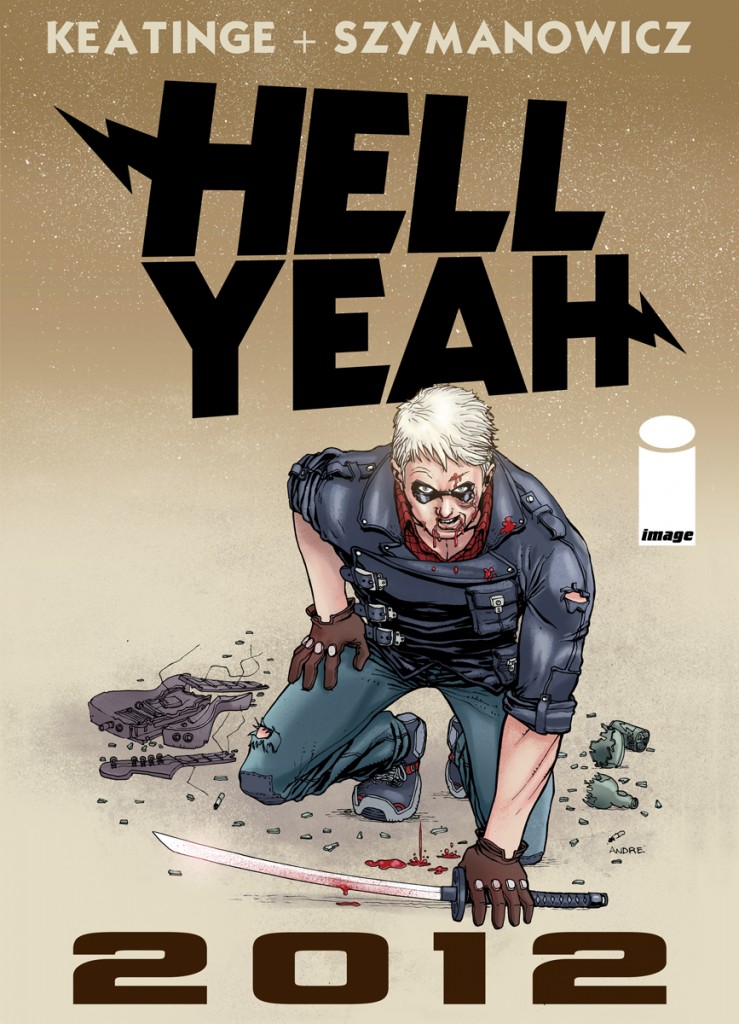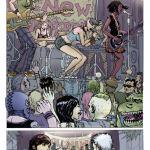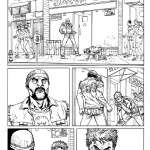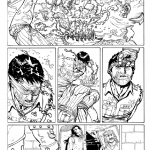 Image Comics made a huge splash at the New York Comic Con with the creator owned comics panel. In addition to announcing Ed Brubaker and Sean Phillips Fatale, the return of the Extreme line of books, and Jim McCann’s new series Mind The Gap. But they also announced a new title called , from writer Joe Keatinge and artist Andre Szymanowicz. Joe Keatinge is a long time pal of iFanboy and after the con we caught up to get the full scoop on what Hell Yeah actually is and how it came to be.
Image Comics made a huge splash at the New York Comic Con with the creator owned comics panel. In addition to announcing Ed Brubaker and Sean Phillips Fatale, the return of the Extreme line of books, and Jim McCann’s new series Mind The Gap. But they also announced a new title called , from writer Joe Keatinge and artist Andre Szymanowicz. Joe Keatinge is a long time pal of iFanboy and after the con we caught up to get the full scoop on what Hell Yeah actually is and how it came to be.
iFanboy: Congratulations on the announcement of Hell Yeah at Image Comics at NYCC. To those who missed your enthusiastic interview on our video coverage of NYCC, can you fill us in on what is Hell Yeah? What’s the plan for the series, is it a mini or an ongoing?
Joe Keatinge: Hell Yeah has been planned from the get-go to be an ongoing series of full-color comic books, printed saddle-stitch, published by Image Comics and sold in comic book stores. I know where it will eventually end, but my hope is to not get there for a very, very long time. The way I look at is I know where the series will begin and where it will end. I have this all mapped out, but I’m giving Andre and I the freedom to go where we want. Maybe we’ll take short detours. Maybe we’ll go on entirely different path. That said, Hell Yeah is the direct result of almost thirty years of comics passion put into one book. I could write it for just about forever. A big goal of the book was to start something in the superhero genre, a genre in which I believe all others can exist, and go as far away from that as possible as well as exploring what other potential it has.
The story of Hell Yeah starts off roughly now, twenty years after the first super-humans made their appearance and changed the world overnight. It’s about the culture they inspired. It’s about finding where you belong in a world where the greatest athletes are now obsolete because someone can run so fast she can bust the barrier of time. The cast will eventually be pretty massive, but to begin with it’s about one guy, Ben Day, who finds out versions of himself are being murdered throughout the multiverse when the girlfriend of one of his other selves seeks him out. We find out he’s the last Ben Day in all-existence, so they need to piece together where his life diverged from all his other selves to find out who is going after him. He’s his own Laura Palmer – that is, his own Macguffin to seeing the much larger world of Hell Yeah.
iF: So Hell Yeah is the direct result of your history as it relates to you’re interest in comics. How so?
JK: Hell Yeah has been in my brain in one form or another since high school. Heck, it’s probably been in there since I first read Image Comics in fifth grade. The idea has percolated ever since in one form or another, whether it was in the comics I drew at the time or even a one-act play I wrote & directed in college. Its always been there and since I’ve been reading comics this whole time, its taken on different influences.
For instance, as I was reading Image I also simultaneously discovered the works of guys like art spiegelman, R. Crumb, Daniel Clowes and Adrian Tomine, to name a few, I began to wonder where these two entirely different types of comics met. Remember the Amalgam universe? The combination of Marvel and DC? I was – still am – interested in the Amalgam of Image and Fantagraphics! Where’s the middle ground between Youngblood and Love & Rockets?
When I started discovering Japanese artists like Katsuhiro Otomo and especially Naoki Urasawa and European guys like Moebius, Hugo Pratt and Milo Manara the possibilities just exploded. It was the World Comics theory that Paul Pope prophesied all those years ago, wherein a generation raised with the access to such a wealth of material from all over the world would have a lot more diverse influences than any generation come before. I look at newer creators like Little Thunder, Marian Churchland and Emily Carroll and I get more excited about comics than ever before. I want to use Hell Yeah to explore the nexus to all these comic realities. Given how pretty much every genre works in the superhero genre, it’s the perfect way to explore other possibilities, maybe some superhero comics haven’t traditionally been known for.
iF: The concept of super heroes in a world of celebrity has been done by others, most notably Youngblood and X-Statix and others, hows does Hell Yeah differ?
JK: Youngblood and X-Statix focused on the celebrity superheroes. Hell Yeah is about the world they made, twenty years after their initial appearances. It’s about their effects on culture, economy and government with a focus on the generation born into their world. Even so, all this is merely a starting point. Where do you go in a world where time travel is possible? What’s the effect on religion when a gigantic being comes to Earth to eat the entire planet? I think a lot of the times when comics explore these themes they take the fun out of it. Watchmen is a great comic, but man, it is a downer. I like Marvels too, but I don’t want to see how Celestials effect an old man. I want to see how they effect hot bands. Either that or the works just mock the superhero genre, which is fine if that’s what you want, but I love superheroes. I love the infinite potential the genre promises and I believe its never been fully realized. I think superhero comics as we know them from, say, Marvel and DC are in actuality a sub-genre. I think there’s a lot to be explored. I don’t buy that the genre is a dead in a world that’s given us Miracleman, Flex Mentallo and King City, whose Catmasters I imagine as the 21st century’s Green Lantern Corps. Brandon would probably disagree with me to view it as a superhero book, but I think it has a direct relation. I’ll concede it’s more of a cousin to the genre, but still. Its impact and promise of potential is there.
iF: You’re working with Andre Szymanowicz on this project – how did you two come together and how has been working on Hell Yeah been? given this is such a deeply personal project, is Szymanowicz delivering on the sotry you see in your head?
JK: Andre and I came together through working on PopGun. I believe Mark Andrew Smith suggested I work with him. It’s interesting, because there was an attempt to do Hell Yeah years ago with another artist and it was a pretty spectacular failure. Nothing was ever published, but the incredibly poor results depressed me to the point I didn’t think Hell Yeah could ever happen. It was a long time until I could even look at the first script again. However, once Mark suggested I look at Andre’s stuff, I saw he was the guy born to draw this thing. His art style was disturbingly close to how I was envisioning it in my head all these years, much more than the other artist. In fact, after we discussed doing the book together at a San Diego Comic Con, I went back and rewrote the entire issue and revamped my outline for the series to the point it became an entirely different book from the other attempt, but one much truer to my own sensibilities.
Andre’s a phenomenal artist and I feel lucky to work with the guy. The series is what is today because of him. If it ever had another artist, it wouldn’t be nearly the same book. He’s everything I want out of a collaborator. I have every expectation Marvel and DC will be knocking on his door as soon as Hell Yeah debuts.
iF: You’ve previously worked at Image Comics as a staffer and have been very public about the importance of creator owned comics, could you have done Hell Yeah anywhere else besides Image? How important is creator owned comics in today’s marketplace.
JK: I’m very public about the importance of comics, period. Creator-owned comics are certainly part of that, but I think comics is a much more complex organism than a simple creator-owned vs. work-for-hire, A is A, Black-and-White-and-Nothing-In-Between kind of deal. I do tremendously love creator-owned comics, but at the same time I don’t think there’s anything wrong with work-for-hire comics. Quite the opposite. I’ll certainly be doing more of those too, in addition to the one I’m already doing, Glory.
I think what’s important is not limiting your field of vision with the type of comics you take on. There’s as much of a benefit, albeit differing, to doing work-for-hire comics as there is to doing creator-owned comics. You need to mix up what type of work you do so your output doesn’t become stale. That’s a big reason why I’m so active in my simultaneously developing my career overseas as well. I want constantly take on new and different challenges.
You have this amazing medium where you can achieve what other mediums can only dream about – the impossible can be made real as long as you can press buttons and/or push a pencil. Why limit that to only one approach? Why not do creator-owned superhero comics or work-for-hire cowboy comics or sci-fi mini-comics? From a creator, I want to play in the infinite variations of ownership, genre, format, styles and world regions. For instance, I’m currently developing something to debut first in the French market and the mechanics on writing are wildly different from what works in America. I’m required to approach my writing differently from a technical standpoint. It’s a challenge I really enjoy. I think if you get to the point where you’re doing the same cookie cutter approach to all your work you run the risk of becoming bored to yourself and, in turn, boring to everyone else after a while.
Right now I’m pretty intrigued with doing licensed comics, because I think needing to work within these rules and seeing where you can go presents an interesting challenge in of itself. I can see where some people would find that limiting and I can definitely understand being frustrated with licensors cracking the whip on what you write. However, in the long run, I think having those limits applied to you will make your other work more refined in the long run. I certainly know writing short stories no longer than eight pages for years has made more appreciative of what I can do with the length of a standard comic.
All this said, no, Hell Yeah wouldn’t have worked anywhere else. It was directly inspired from Image Comics. It’s very much, at the very least, a thematic if not direct sequel to all those early Image Comics. When I was developing it I envisioned it as an ongoing series, in the printed comics format, published by Image. The root code of Hell Yeah, so to speak, is the inspiration birthed from those early books grown up over the period of two decades. This is an Image comic through and through and by that I mean it’s a comic born and bred to be from the same publisher of Spawn, Youngblood, Savage Dragon, Bone, Strangers in Paradise, Groo The Wanderer, Walking Dead, King City, Orc Stain, Beast, Heart, and so on. Hell Yeah is disguised as a superhero book, but in actuality we’re going to get to a whole lot more in ways I think will surprise a lot of people. Just like the publishing strategy at Image Comics.
iF: Since Hell Yeah represents the culmination of your history with comics, what comics got you to today? What are your most influential creators and titles that have fueled your comics work to date?
JK: Oof. That’s a huge list. I don’t remember my first comic book. No one in my family does. However, I do remember the first time I decided it was my life’s pursuit to create them myself. That was after Spawn #10, the Dave Sim-penned issue, where he and Todd did a big piece on creator owned comics and what they meant. It’s the first time I realized comic book characters weren’t here since the dawn of time. They were things created by human beings and it was possible for me to create my own. So, almost immediately thereafter I started constantly drawing my own comics on whatever paper I can find. Thankfully, many of them still exist in two giant storage containers. If it wasn’t for that one comic who knows where I would be?
Another big one was Madman #1, the Tundra-published issue. I remember exactly what shop I was at – the gone, but not forgotten Superior Comics in Santa Monica, CA. I thought it was just another superhero comic, so I was almost disturbed to find out it was duo-tone, with a lead character who had a major existential crisis immediately after eating a guy’s eyeball. It blew me away and it was through Madman I’d discover a whole bunch of other comics, like Clowes and the Hernandez Brothers. That series overall has had a massive impact on my life.
Pretty much every issue of Savage Dragon is up there too, especially issue #21. I remember being stunned when I saw the cover of a burnt-to-a-crisp Dragon holding up Overlord’s bloody faceplate – at the also sadly defunct Wow Comics in La Crescenta, CA. YOU MEAN YOU CAN ACTUALLY KILL OFF THE MAIN VILLAIN?! I was used to Spider-Man beating the crap out of Green Goblin on a regular basis without a lot of repercussion. This was around the time everybody was cloned or coming back from the dead. Well, in comics anyway. That issue completely blew the doors open on what was possible.Similarly, I remember reading The Dark Knight Returns at summer camp and thinking, “WHAT HAPPENED TO BATMAN?!” I loved it. For what it’s worth, I had the same feeling reading The Dark Knight Strikes Again.
It’s not a specific comic, but I remember my grandmother urged my dad to take me to a screening of Crumb, only knowing it was about comics, and he did and, yeah… that brutalized my brain. I was used to comics about dudes punching out other dudes and here was a guy who did black and white comics about, well, not that, to say the least. This was right around the time my dad would take me to the library and I would constantly rent out the same Spider-Man Vs. Venom collection. However, one time it came out as stolen so I took out the only other comic they had, a little book called Maus. Seeing spiegelman’s approach to comics, well, yeah, again. Brain. Brutalized. It was pretty intense to read this book about a guy’s relationship with his father, the holocaust and his mother’s suicide. The reprint of the suicide comic traumatized me for years.
Additionally, since both of their work was so deeply rooted in older comics artists from the early 20th century, I began to seek those guys out. People like Winsor McCay, George Herriman, Chester Gould, etc. This escalated when my dad brought home a copy of A Cavalcade of Old Time Comic Strips, which I still have. I was drawing panels out of that as much as I was out of Shadowhawk, Corto Maltese or Eightball.
I was just exposed to such a huge variety of comics at a really young age. One day I’d be reading Katzenjammer Kids strips, the next day I’d be pouring over Elektra Lives Again. Somewhere in between were issues of Pitt and Raw magazine. The comics soup of my brain has a pretty wild mix of ingredients. Hell Yeah is what emerges when that soup simmers for three decades. I could easily go on about which comics I love forever. You’ll often find me taking a break at comic cons by flipping through back issue bins or the Stuart Ng Books booth.
iF: When can we expect to see Hell Yeah in stores and what can we expect from Hell Yeah in 2012 and beyond?
JK: Hell Yeah is due in stores March 2012, almost twenty years to the day Image Comics first got me excited to create my own comics. The arc of Hell Yeah is going to cover a lot of ground, including, but not limited to: who’s murdering Ben Days, why they’re saving ours for last and how this ties into the emergence of superheroes, all while we introduce your new favorite band, The All-New All-Differents.
With that, check out this EXCLUSIVE Sneak Peek at artwork from the upcoming Hell Yeah from Image Comics:





man, this looks fantastic. i love the concept too
This a great interview, I’m amazed there’s only one other comment so far. This series sounds great and Keatinge’s enthusiasm both here and in the interview from the video podcast is infectious, rivalling even you Ron. Love that Logo too.
At the risk of sounding like a complete and utter “INSERT EXPLETIVE” but do you read through your articles before you post them Ron? Far be it for me to tell you how to a job that you (and the the rest of the ifanboy team) do so well but I’ve noticed a fair few typos in your posts recently. Just an observation mind you and like I said, It’s a great interview. I’ll stop digging the hole I’m in now and shut up.
I believe there’s so few comments because Joe is so well spoken that there’s nothing more to be said. 😛
Hell Yeah!